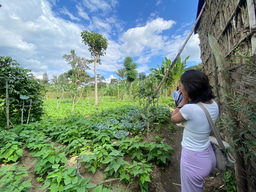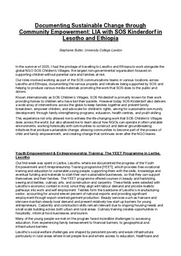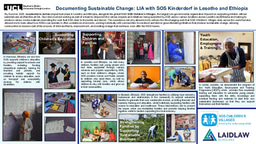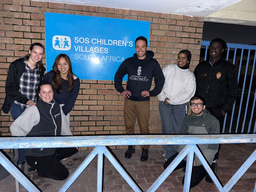Trade Union Organizing in Tunisia: LiA Reflection Week 1 (June 23-28)

For six weeks this summer, from the end of June to the very beginning of August, I am interning at the Union Générale Tunisienne du Travail (UGTT) or الاتحاد العام التونسي للشغل, the largest trade union in Tunisia with its headquarters in the capital city of Tunis. There are so many objectives for my internship, but among the most important ones are to build global union solidarity, to learn from the UGTT's model for organizing tech workers and other workers in precarious or fissured sectors, and to expand the collective imagination for what another kind of labor movement (a stronger one, a more unified one, a more powerful one) might look like.
I did my research project last summer on artificial intelligence and its impacts on work, focusing more on theory—that is to say, on understanding how machine learning technologies are affecting our current cultural milieu and perceptions about labor elimination—than on how these changes have physically impacted the material conditions of workers’ lives. However, I have matured as a student in the one year that has passed, and my philosophy of life has changed, too. I actually think my research from last summer was largely meaningless because it embodied the divide between theory and practice.
Instead of doing a proper workers’ inquiry about technological transformations in work from the ground up, I relied on existing theories for understanding these new systems, using a top-down approach. I suppose that is the literal objective of the Research in Action project, then: to philosophize with a hammer, to stop my ceaseless unraveling of the Penelope’s veil, to test what I have already theorized by putting it into practice and seeing whether or not it holds up. First and foremost, any argument that I ultimately make will come from what workers themselves have told me and from the experiences of organizers with the UGTT.
✩
The UGTT has a long and storied history that cannot be understood without also understanding its integral involvement in the fight for Tunisian independence from French colonial domination in 1956. The trade union was founded ten years before liberation by the trade union leader Farhat Hached, who was assassinated in 1952 by La Main Rouge, a French terrorist organization operated by the French foreign intelligence agency.
Now, nearly eighty years later, the trade union has hundreds of thousands of affiliated workers and occupies a central position in the creation and defense of labor legislation and the rights of workers in Tunisia. Since its inception, fighting to throw off the yoke of colonial rule, the UGTT has been fighting for defense of the most vulnerable people in Tunisian society. However, its scope is not just limited to the national but to the international, too. In its charter, it pledges to fight for the rights of all oppressed people all over the world.
This manifests in many ways, as I have observed in my first few days with the organization, and can serve as a model of solidarity in leadership for anyone invested in strengthening the labor movement. It manifests in building the power of the organization, which starts with education; the union is dedicated to training its members through workshops, conferences, and the raising of political and class consciousness. It controls its own archive of union activities and publishes a weekly newsletter that is distributed far and wide across Tunisia.
Power also comes directly from the structure of the organization, and from having an extensive network of organizers, and various forums for ensuring that leaders adhere to the charter of the union. Today, I attended a conference on the Solidarity and Social Economy that brought regional trade organizers from all over Tunisia to Tunis to discuss their experiences and to share tips, tactics, and common frustrations with one another—to reflect on what has worked and what has not, and how these factors change across sectors and local situations.

This pledge is also evident in the support of the union for Palestinian liberation. The support for Palestinian people, for humanity, is not just limited to the UGTT but to the vast majority of Tunisians that I have met so far, whether on the beach or in the gym or painted on the walls that construct the city I am beginning to know, and beginning to love.
I recently watched a video from NYC mayoral-elect Zohran Mamdani, who spoke about growing up in South Africa, who said that there was absolute solidarity with the Palestinian cause because the people of South Africa recognized what it meant to suffer from the brutality and impunity of Western imperialism. Today, at the conference, beside the flags of Tunisia and the UGTT stood the Palestinian flag. It served as an indispensable reminder that those dedicated to the creation of a more just form of social organization than capitalism must also fight against capitalism’s highest form, imperialism. To put theory into practice for the UGTT is to recognize that as long as the Israeli government continues to systemically murder the Palestinian people in a livestreamed genocide, until Palestine is free, no worker, no person is truly free.
⏾
While I have deeply enjoyed every minute spent at the UGTT thus far (truly, it is so mind-blowing to be in a country where trade unionism is not just exceptional or undisclosed, but a large and respected part of the national culture) there were some small administrative difficulties on Monday, Tuesday, and Wednesday, as well as the national holiday of Hijri New Year on Thursday, that meant that my first full day of work took place on Friday.
I struggled a bit in the beginning to figure out my schedule and the department in which I would be placed, as I think the staff at the UGTT were a bit surprised to have me there, and I don’t blame them a single bit. If a random white American girl—especially in this political moment, where Trump has continued the legacy of unjustified United States military intervention in the Middle East, where American tax dollars are responsible for the bombing of Tehran and the deaths of innocent civilians—showed up at my trade union office in Tunisia, I would be bewildered and skeptical.
Another key detail of my internship is that while French remains the administrative language of many Tunisian businesses and schools, Arabic (specifically the dialect of Tunisian Arabic or Derja), is the language written and spoken in the union. I am very aware of the fact that I am speaking the imposed colonial language in a context where it is typically not present, and it is for this reason that I am even more grateful for and apologetic to my supervisor and the people I have met so far whom I have been able to use French or translation services with in discussion.
Next week will be my first official full week because of the hiccups early this week, and there is so much that I hope to do and accomplish. I will try to organize meetings with department leaders specifically in the tech and contract labor department at the UGTT, as well as trying to develop contacts directly with tech workers, both those affiliated with and not affiliated with the UGTT, to gain a broader understanding of the scope of the tech worker industry in Tunisia.
I also will hopefully start learning a bit of Derja next week, so I would love to be able to use a few words when I am talking with my coworkers. I also think that I was a bit too shy, a bit too timid this week, and I would love to form more connections with the other trade unionists in the next week. Additionally, I am trying to write a little bit each day, reflecting on what I observed and what I learned at work and in my personal reading for my thesis, so I really need to be consistent with scheduled time for reflection.
This internship literally would not have materialized in any way shape or form had it not been for my incredible Georgetown professor, Jeffrey Wheeler, my wonderful host family in Tunis, or the aid and support of Colleen and the Center for Research and Scholarships at Georgetown—they are the reason that I was able to come to Tunis in the first place, and I don't have words enough to thank them for all of their support.
People have shown me such kindness and sacrifice that I will truly never be able to repay. In a similar vein I am aware that I also would not be here were it not for the financial support of the Laidlaw Foundation. To be able to work at organizations without pay, to be encouraged to travel and live and work abroad, is a tremendous gift that will shape the rest of my life, and one that I will not take for granted.






Please sign in
If you are a registered user on Laidlaw Scholars Network, please sign in